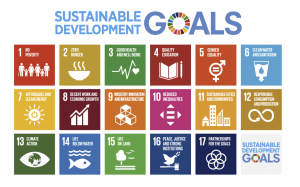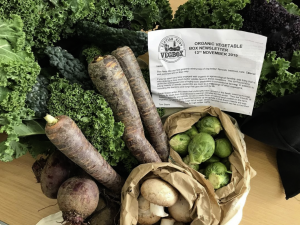COP26 has been dubbed “the world’s best last chance to get runaway climate change under control”. But what is it really? What are the hopes and expectations? And what does it all mean for King’s and yourself?
What is COP26?
The 2021 United Nations Climate Change Conference, COP26, is the most critical climate conference in a generation, aiming to get international agreement and mobilise finance to secure global net zero by mid-century, adapt to protect communities and natural habitats, and keep 1.5 degrees within reach. This year’s conference is hosted by the UK in partnership with Italy and is taking place between 31 October and 12 November.
This Conference of Parties (COP) takes place annually and previous sessions have produced some of the most critical global deals, including the Paris Climate Agreement which came out of COP21 in 2015. This saw 189 UN member states agree to keep the increase in global average temperature to well below 2 °C above pre-industrial levels, and to pursue efforts to limit the increase to 1.5 °C. COP25 did not have significant achievements, so the pressure is on to produce tangible outcomes from COP26.
The main discussion will centre around the following points:
- Increase commitments (NDCs) to ensure 1.5 °C is credibly within reach by 2030 and global net zero by 2050.
- Develop clear strategies for adaptation to protect communities and natural habitats (e.g. by restoring ecosystems and building defences).
- Commit to a global finance package of $100 billion to help developing nations mitigate and adapt to climate change.
What can we expect?
The hopes for this conference to drive real change are high – and the urgency to do so even higher. Pope Francis called it “a real chance for change”, and Boris Johnson emphasised how COP26 must be a “turning point for humanity”. But what can we realistically expect?
Although most world leaders have expressed the importance of this conference, the required action is lagging behind. There is a need for near-term policy action and large investments, which is where political leaders often become more hesitant. This again became clear at the recent G20 summit which saw an agreement to take “meaningful and effective” action to limit global warming but few concrete commitments.
Throughout the conference, the finance aspect will represent one of the main challenges. The scientific community agrees that although addressing the climate emergency might seem costly, inaction will be much costlier in addition to destructive. The developed countries’ plan to deliver $100bn of global climate finance is expected to be met and exceeded from 2023 (three years late from the initial 2020 target). However, more adaptation support for the most impacted countries is required and further trillions need to be mobilised for climate transitions. The debate is largely around the question: how responsible are developed nations for the current climate crisis, and therefore, to what extent should they be obliged to pay for developing nations’ mitigation and adaptation measures?
COP26 & King’s
This is a huge opportunity for the UK, and the education sector in particular, to show the brilliant work that education institutions are doing on this agenda, and it is also a good time to stock take and look at how institutions can do more (EAUC).
COP26 is not only about political leaders – there is a range of non-state actors which are involved and are a key part of delivering on any climate decisions that are made, as well as of demanding more ambition. This includes civil society, businesses, financial institutions, NGOs, and also universities. Universities are in a unique position to contribute to solutions to climate change through the nature of our core work in education and research and through our ability to bring people together. And we also have the responsibility to do so.
The societal, economic, political, and technological transformations required to address climate change will be driven by world-class research. Therefore, part of our action strategy includes contributing our expertise to maximise the impact of COP26. Several of King’s climate researchers will be speaking at COP26 events. Kris De Meyer, for example, is running an online event with Chatham House on policy pathways from climate risk to policy action. Grace Souza will be in Scotland supporting indigenous delegations travelling from Brazil to Glasgow for COP26. Tamsin Edwards will be speaking at several events, including “Polar warming, global warning”, and “Inclusion is key: How gender equality improves science, tech and innovation for climate action” (streamed on the UK Gov YouTube channel).
King’s is also actively collaborating with the wider sector through the COP26 Universities Network – a growing group of more than 80 UK-based universities and research centres working together to raise ambition for tangible outcomes from the UN COP26 Climate Change Conference. The Network will create lasting partnerships and legacies that reach beyond this single event.
COP26 & you
How does any of this affect you personally? COP26 might be an important conference, but the action that is taken on the ground is far more important, and that includes you. There is a range of ways you can get involved in climate action at King’s and beyond.
- Join the King’s Climate Action Network to drive climate action at King’s by reducing our emissions and maximising our positive impact through education, research, and engagement.
- Participate in one of King’s many sustainability projects and initiatives.
- Explore King’s sustainable clubs and societies such as the Climate Action Society.
- Sign petitions, write to your MP, attend climate protests… Check out this page for the 16 most effective ways to reduce your carbon pollution.
There is no right or wrong way to take climate action. It is about finding what works for you and working on it together. Together we can change climate change.
Useful resources & relevant events
King’s resources
- Check out COP26-specific events here, and keep an eye out for climate-related events here beyond the conference.
- Listen to King’s COP26: we got this podcast. While you are at it, also check out the King’s Spotlight on Sustainability podcast – the first season of which is focused on climate change. King’s WORLD: we got this podcast also has some episodes focused on climate.
- Read King’s climate scientist Tamsin Edwards’ blog post evaluating the success of COP26
General resources
- Follow the following social media accounts to stay up to date throughout the conference: @cop26uk for the official news, @cop26.tv for an alternative view, @cop26coalition for a focus on climate justice, and @mockcop26 for a youth-led perspective.
- The majority of public events will be streamed live on the COP26 YouTube channel.
- Check out this jargon buster to make sure you understand the terminology being used at COP26.
- Have a look at this infographic which summarises COP26 in an easily consumable but comprehensive way.
- Check out this two-week course to explore global issues during COP26 and be part of the call for collective action: Learning for a Sustainable Future: Live at COP26.
Daily updates
Below we will include daily updates about the conference. Each day at COP26 has a specific theme that guides the conversations and events. You can find the full Presidency Programme here.
Day 1: Procedural opening of negotiations (31 October)
The start of COP26 follows days of tough climate negotiations among the G20 – the group of 20 major economies. Their final statement pledges “meaningful and effective” action to limit global warming, but offers few concrete commitments. The pressure is on for COP26 to produce clearer outcomes. Delegates and officials attend the Procedural Opening of the conference.
Day 2: World Leader’s Summit (1 November)
By the end of the day, the summit’s first major deal has been struck. In this deal, more than 100 world leaders including Brazil, Russia and Indonesia promise to halt and reverse deforestation by 2030. The signatories cover around 85% of the world’s forests.
The Indian Prime Minister also pledged to reach net zero emissions – but not until 2070. This misses a key goal of COP26 to reach global net zero by 2050.
Day 3: World Leader’s Summit (2 November)
During the second and final day of the summit, more than 40 world leaders find agreement on a global plan to boost green technology by imposing worldwide standards and policies.
The US and EU also announce a global pledge to slash methane emissions, which more than 80 nations have signed up to.
South Africa – a major emitter of greenhouse gases – is expected to receive $8.5bn to help end its reliance on coal.
Day 4: Finance (3 November)
The UK announces a plan to force firms to show by 2023 how they will hit net zero.
How much money should the Global North give to the Global South to take historical responsibility and support these countries’ climate transitions? Conversations address this question, but no clear answers are developed.
However, new commitments including a pledge Japan made yesterday, could speed up reaching the goal of offering $100 billion for climate finance for developing nations, paving the way to achieving it by 2022 instead of 2023.
450 organisations controlling around two-fifths of the world’s financial assets ($130 trillion dollars!) have backed a plan to support “clean” technology.
Day 5: Energy (4 November)
This day is largely about the move away from dirty coal towards renewables. More than 40 countries have already pledged to phase out coal. However, critics say there are significant gaps with some of the most coal-dependent countries including the US, China and India not making such pledges. Another point of criticism is the silence around oil and gas.
Moreover, 20 countries including the US have pledged to end public financing for “unabated” overseas fossil fuel projects by the end of 2022.
Day 6: Youth and public empowerment (5 November)
Marking the theme of the day, thousands of young people march through Glasgow in a mass climate protest organised by Fridays for Future Scotland. This march addresses the need for these climate discussions to move away from closed environments, making them accessible to the wider public including youth.
Nadhim Zahawi, the UK’s Education Secretary, has also mentioned changes to the primary curriculum to include a bigger emphasis on climate change and sustainability.
Day 7: Nature (6 November)
Today is the Global Day of Action for Climate Justice. Thousands of demonstrators take to the streets to have their voices heard.
Day 8: Rest day (7 November)
Today, events and negotiations both paused to re-energise for the second and final week of the conference.
Global Witness also shared an analysis indicating that lobbyists for big polluters have the largest delegation at COP26, “flooding the conference with corporate influence”.
Day 9: Adaptation, Loss & Damage (8 November)
The UK has pledged £290m to help poorer countries deal with climate change. Most of this money will go to Asian and Pacific countries and is said to support climate action, conservation efforts and the promotion of low-carbon development.
Day 10: Gender and Science & Innovation (9 November)
During today’s conversations the disproportionate impacts of climate change on women and girls across the world were made central. The importance of science for efficient policies and impactful agreements was also a key focus.
The Climate Action Tracker shares its most recent analysis showing that the world is headed for global warming of 2.4C despite pledges made by several countries during COP26 – far above the 1.5C limit.
Day 11: Transport (10 November)
Today, the first draft of the COP26 agreement was published. It calls for stronger carbon reduction targets to be confirmed by the end of 2022. Another important point is that vulnerable countries should receive more support to deal with the impacts of climate change. Negotiations will continue the next few days with the aim to publish a final agreement by the end of the day on Friday.
Day 12: Cities, Regions and Built Environment (11 November)
A report is published estimating that the carbon footprint of COP26 is double that of COP25 in Madrid in 2019, with international flights being a significant contributor.
China and the US announce a joint pledge to speed up climate action and boost climate collaboration between the two countries.
Day 13: Closure of Negotiations (12 November)
A second draft agreement waters down commitments to end the use of coal and other fossil fuels. The text has changed from accelerating “the phasing-out of coal and subsidies for fossil fuels” to accelerating “the phaseout of unabated coal power and of inefficient subsidies for fossil fuels”. The inclusion of coal still represents a landmark moment. It also increases pressure as countries are asked to submit their NDCs before next year’s COP instead of the previous every 5 years. Besides, the new draft increases support for poorer countries to address climate change.
13 November: a deal is struck
The deadline to find agreement is not met, but on Saturday evening the final deal is published. This deal asks countries to resubmit their NDCs before next year’s COP with more ambitious targets to reduce emissions by 2030. The need for increased financial support (beyond the current $100bn target) from developed countries to developing countries to help them mitigate and adapt to climate change is emphasised.
A key point of criticism is the watering down of language around ending the use of coal (for the second time). After the change from phase-out of coal to the phase-out of unabated coal, it has now been changed to “phasedown” following a last minute intervention lead by India and China. The call for a phase-out of inefficient subsidies for fossil fuels has remained unchanged.
Most developing countries are also not satisfied with the agreements around financial support, adaptation, and loss & damage. They argue it is not sufficient to help them address climate change – the impacts of which have already been destructive for many of them.
Although this agreement is not legally binding, it is still expected to shape global climate action over the next decades.




